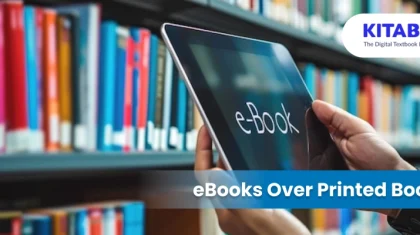
Beyond Books: K12 eTextbook Platform Innovations
Summarize this blog with your favorite AI:
In the modern educational landscape, digital textbooks have become the foundation of learning and are reshaping traditional classroom dynamics. The inclusion of online and hybrid modes of education is greatly influencing the demand for digital textbooks in the academic world. Through this transformation, publishers are finding new opportunities to create innovative learning materials that surpass the boundaries of traditional textbooks.
In the process, digital textbook platforms for K12 publishers are constantly evolving and emerging as powerful tools in the academic domain. They leverage modern techniques to offer dynamic and interactive learning experiences for learners and educators.
Here, we’ll discuss the role of digital textbook platforms for K12 publishers and the type of innovations used for upgrading the learning pattern.
Table of Contents:
I. Role of Innovations in Digital Textbook Platforms for K12 Publishers
- Enhanced Engagement and Learning Outcomes
- Scalability and Cost-Efficiency
- Support Personalized Learning
II. Innovations in Digital Textbook Platforms for K12 Publishers
Role of Innovations in Digital Textbook Platforms for K12 Publishers
In this age of technological advancements, innovations play a major role in transforming the K12 eTextbook platforms. These innovations aim to meet the diverse needs of modern learners and educators by enriching the learning modules.
The inclusion of technological developments, pedagogical approaches, and interactive elements enhances the learning experience and boosts engagement.
Enhanced Engagement and Learning Outcomes
In recent years digital textbook platforms have transformed from boring PDF repositories to revolutionary interactive learning systems. By blending technology and education, they offer a gamut of features to improve the learning experience each day.
It helps to create dynamic learning content that can engross the learners’ attention and provide a thorough understanding and retention of concepts. Thus, it leads to higher student motivation and engagement accompanied by academic success.
Scalability and Cost-Efficiency
eTextbook platforms are more scalable and economical for K12 publishers. Printed textbooks need plenty of resources for production, distribution, and storage and incur a heavy cost.
However, digital textbooks can be distributed effortlessly using electronic media, thus minimizing the overhead expenses. Also, it can be easily updated and shared with a larger group of audience, without spending a penny on reprinting and distribution processes.
Support Personalized Learning
Modern publishers leverage digital textbook platforms to support personalized learning methods for diverse groups of students.
The platform allows instructors to modify the academic content, use real-time data analytics and collaborative tools to personalize their teaching approaches, acknowledge individual academic needs, and deliver planned support.
The digital course materials empower educators to create highly interactive and engaging learning sessions that would meet the capabilities and challenges of every student.
Innovations in Digital Textbook Platforms for K12 Publishers
Transformations are common in educational systems, and to take the learning process to a new level, it has to be blended with technology and innovations. This will enrich the learning resources and help create dynamic learning experiences in K12 education.
Following are a few top innovations that are integrated into digital textbook platforms for K12 publishers to make the learning process engaging and memorable.
Interactive Multimedia Integration
Digital textbook platforms for K12 publishers incorporate interactive content and multimedia elements to enhance understanding and boost engagement.
Audio clips, videos, animations, simulations, interactive quizzes, and more bring learning to life. They help simplify complex concepts, spark curiosity among students, and offer a deeper understanding of the subject matter.
The interactive multimedia elements enrich the online learning resources and boost students’ attention so that they can actively engage and interact in the learning sessions. Thus, they meet the diverse learning styles of students. In this regard, KITABOO is an ideal solution. It helps create customized content depending on the ever-evolving curriculum standards.
Adaptive Learning Algorithms
The digital textbook platforms use adaptive learning algorithms to provide personalized learning experiences based on the individual needs of each student. Educators can leverage these algorithms to track student performances, their learning preferences, and pace to deliver customized learning modules.
These algorithms blend in with the content and progress of the learning modules according to the strengths, weaknesses, and learning patterns of students.
Besides, adaptive learning algorithms offer optimized learning results through targeted recommendations and evaluations. Students can continue their learning journey at their preferred pace, nurturing students’ flexibility, boosting retention rates, and ensuring personalized learning support for each student.
Gamification Elements
Digital textbook platforms integrate gamification elements like badges, leaderboards, quizzes, and rewards to improve student motivation and engagement. It transforms learning sessions into a fun-filled and interactive experience.
The reward system motivates the human brain to improve performance. When people earn instant points, badges, rewards, and feedback for completing a certain task or reaching a particular milestone, their brains are reinforced, and they continue with their efforts.
Such learning modules build enthusiasm among students and motivate them to complete the modules on time. Students can even track their performance, which helps to cultivate a sense of healthy competition among peers, thus boosting engagement and improving academic excellence.
Collaborative Learning Tools
Digital textbook platforms allow students and educators to collaborate using diverse tools, such as group projects, discussion forums, and peer review components. Such collaborative elements boost active learning, critical thinking, and knowledge sharing during learning sessions and beyond.
The real-time collaboration tools help students to work in teams and encourage peer-to-peer teaching. For example, by incorporating annotation tools in a literature eTextbook will allow students to collaborate and annotate texts, promoting peer discussions and analysis.
Thus, it blends a sense of community and engagement among students and enables them to learn and share insights from each other.
AI Powered Learning Assistants
With AI technology evolving in every sector of business, the educational world is not left untouched by its virtues. Several digital textbook platforms are leveraging AI to enrich and elevate their learning modules for K12 classrooms.
Publishers are leveraging AI-powered learning tools to offer dynamic learning experiences, such as personalized teaching, solving real-time students’ queries, and targeted feedback and guidance.
Besides, educators can leverage these virtual assistants to collect student data, suggest learning modules, and batch students based on their learning needs. This will help educators identify students who need more personalized attention, thus ensuring that everyone learns the concepts well.
Immersive Learning Technology
With technological advancements, eTextbook platforms for K12 publishers are becoming more sophisticated every day. These platforms leverage Virtual Reality (VR) and Augmented Reality (AR) to provide an immersive learning experience.
For example, history lessons on ancient civilizations can be made more realistic and engaging using VR, where students can virtually explore the historical sites. Such immersive learning experiences make the learning process engaging and memorable and connect theoretical concepts with real-world applications.
Conclusion
To sum it up, digital textbook platforms for K12 publishers have revolutionized a significant transformation in K12 education. Though physical textbooks hold immense value in education, they’re no longer the only resources for nurturing effective learning.
By adopting such innovative methodologies, digital textbook platforms are evolving as powerful learning tools to enhance student engagement. They offer personalized learning experiences and data-driven approaches to create a dynamic makeshift from static learning resources to digital versions.
KITABOO, the digital publishing platform, blends technology and innovation to create, publish, and distribute eTextbooks for K12 publishers, educators, and learners. The platform leverages cutting-edge technology and AI-powered assistants to create learning resources.
To know more, write to us at contact@kitaboo.com.
Also check:
Discover how a mobile-first training platform can help your organization.
KITABOO is a cloud-based platform to create, deliver & track mobile-first interactive training content.



